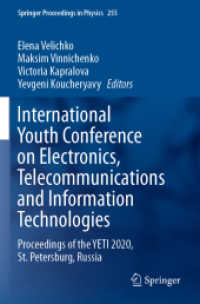- ホーム
- > 洋書
- > ドイツ書
- > Humanities, Arts & Music
- > History
- > general surveys & lexicons
Description
This volume examines the role played by the medieval past in its many representations up to the present day. Continuing the theme of Volume 8 of the same series, which examined the early medieval search for origins in relation to building a sense of identity and social memory, this volume focuses on the modern appropriation of the early medieval past. The early Middle Ages played an important role in the creation of a sense of identity for modern European nations. In the 18th and 19th centuries, a process was begun of delineating Europe according to peoples and nations. This conception of people and nations as quasi-natural forms of social organisation, often claimed as being historical but ultimately considered to be a trans-historical phenomenon, still survives in modern Europe and unfortunately seems to be increasing in importance in the political disputes in certain areas. Most of the contributions in this volume deal with the appropriation of the early Middle Ages from the perspective of national histories. A few contributions examine strategies of using the early medieval past in other contexts. It is thereby possible to identify patterns of how, in the varied social contexts of modern Europe, images of the Other have been transmitted or the sense of belonging has been legitimised.








